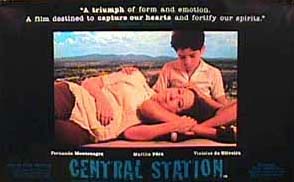|
| |
|
REVIEW: "This is the evolution of two "souls" who intersect on the path of life and gravitate to a higher evolution of awareness as we all should." C. Sordoni. "A powerful tear-jerker of uncommon grace and heart." Promotional Lines: "He was looking for the father he never knew. She was looking for a second chance."
This life changing journey for both a little boy and an older woman begins in Rio de Juneiro's Central Train Station, where Dora (Fernanda Montenegro), a cynical, self-centered retired school teacher has taken on a second career as a letter writer to support herself. Brazilian teachers don't receive much of a pension. For a small fee, Dora sat at a table all day, in the Central Train Station, writing letters for people who are illiterate. She promises to mail the letters. However, she seldom did, as she either would throw them away or would stick them in a drawer in her tiny apartment. As a source of entertainment, she would read the best ones with her close friend, Irene (Marilia Pera.) One day, Dora is asked to write a letter for a woman, Ana (Soia Lira) and her 10 year old son, Josué (Vinicius de Oliveira). Ana had Dora write to Ana's husband, who she ran away from because he was a drunkard. The boy, Josué, wanted to meet his father, and so Dora wrote down the message, for Ana in a letter to reestablish contact with the father. Unfortunately, the next day, Ana was run over by a bus, leaving Josué an orphan on the streets. The relationship between Dora and Josué had a rocky start at first. He reaches out to Dora, who ignores him at first. She offers him something to eat after a couple of days, which he refuses at first. Josué has nowhere to go, so he continues to hang around the train station, where he is noticed by the unscrupulous armed guard, hired by the shop keepers to protect them from street kids who steal items. The guard approaches Dora with a business proposition. She agrees to take in the boy for the night, and then sell him to a gang that traffics children. She receives a large sum of money which she uses to buy a large T.V. After being scolded by her neighbor, Irene, for selling the boy, Dora's conscience is pricked and she goes back to the gang's apartment and quickly rescues Josué, who is understandably mad at her. Josué doesn't trust her as far as he could throw her, but he has no other choice but to follow her lead. What to do next? They couldn't stay in Rio de Juneiro, as the armed guard, not to mention the gang would soon pay a visit to collect their property, and perhaps Dora would meet the fate suffered by a youth who dared to steal an item at the beginning of the film; being shot dead by the guard. Dora quickly buys bus tickets for herself and the boy, and they in haste leave Rio de Juneiro on the quest of finding Josué's father, who lives in the back country of the sparsely populated northeast corner of Brazil. Their adventures together begin, through which they discover that they have a lot in common. Through various set-backs and troubles, they have to depend on each other, working to solve the situations they find themselves caught in. These trials act as a catalyst which change both of them; Dora from a selfish, cynical woman, to one truly willing to do what is best for her young friend. Josué changes from a hurt, distrustful boy, to one willing to see Dora's slow transformation, forgiving and even loving her, as her long-buried humanity resurfaces. This realistic peek at both the good and bad in Brazilian society, which is inbedded in this poignant powerful screenplay, written by Marcos Bernstein, Joao Emanuel Carneiro and by the director Walter Salles, and is brought to life by marvelous direction of Salles and a dynamite cast, makes this film a classic among foreign films. It is no wonder that it was a Golden Globe winner for Best Foreign Language film. It was also nominated for an Oscar for Best Foreign Language Film as well. Fernanda Montenegro, the great Dame of Brazilian television, gives an outstanding performance as Dora, which earned her a much deserved Oscar nomination for Best Actress. She was the first Brazilian actress ever to be nominated for an Academy Oscar. Vinicius de Oliveira also offered a fine performance as the wily, quick thinking Josué, who in true Brazilian fashion finds a way around their tough situations in order to survive what life hands them. This young man was discovered by Salles at the airport, as he was working as a shoeshine boy. The chemistry between Montenegro and Oliveira sparkles, which is one of the reasons that the story is so enjoyable. Under the fine direction of Salles, play off each other's acting, bringing the script roaringly to life. Walter Carvalho does a wonderful job with the cinematography, capturing visually the hard, mean streets of Rio de Juneiro, as well as the friendliness, spirituality and helpfulness of the Brazilian people. CENTRAL STATION is rated R. There is some rough language, no sex, one shooting in the beginning (no blood), and is a realistic portrayal of both the good and bad elements in Brazil, which all together doesn't seem like the typical R film. Children 13 and over would find the film an interesting study of human nature. Parents should view the film first to decide if the film is suitable for their children. If you enjoyed CENTRAL STATION, you may also like KIKUJIRO, PAPER MOON, BILLY ELLIOTT, and ABOUT A BOY. |
|
Foreign Index - Action Movies*Comedies*Dramas*Musicals*Romances*Sci-Fi |
